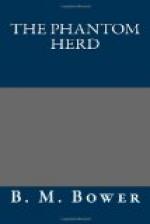By the time the Convention was assembled the next day, however, he had recovered his old spirit of driving energy. The chairman had invited him by telephone to attend the afternoon meeting, and Luck went—to be greeted by a rousing applause when he walked down the aisle to the platform where the chairman was waiting for him.
Resolutions had already been passed, the Convention as a body thanking Luck Lindsay for the privilege of seeing what was in their judgment the greatest Western picture that had ever been produced. The chairman made a little speech about the pleasure and the privilege, and presented Luck with a letter of endorsement and signed with due formality by chairman and secretary and sealed with the official seal. Attached to the letter was a copy of the vote of thanks, and you may imagine how Luck smiled when he saw that!
He stayed a little while, and during the recess which presently was called he shook hands with many an old-timer whose name stood for a good deal in the great State of Texas. Then he left them, still smiling over what he called his good luck, and wired a copy of the letter of endorsement to all the trade journals, to be incorporated in his full-page advertising. By another stroke of luck he caught most of the trade journals before their forms closed for the next issue, so that The Phantom Herd was speedily heralded throughout the profession as the first really authentic Western drama ever produced. By still another stroke of what he called luck, an Associated Press man found him out, and was pleased to ask him many questions and to make a few notes; and Luck, wise to the value of publicity, answered the questions and saw to it that the notes recorded interesting facts.
That evening Luck, feeling that he had reached the last mile-post on the road to success, hunted up a few old-timers who appealed to him most as true types of the range, and gave them a dinner in a certain place which he knew was run by an old round-up cook. There was nothing about that dinner which would have appealed to a cabaret crowd. They talked of the old days when Luck was a lad, those old-timers; they talked of trail-herds and of droughts and of floods and blizzards and range wars and the market prices of beef “on the hoof.” They called in the old round-up cook and cursed him companionably as one of themselves, and remembered that more than one of them had run when he pounded the bottom of a frying pan and hollered “Come and get it!” They ate and they smoked and they talked and talked and talked, until Luck had to indulge himself in a taxi if he would not miss the eleven o’clock train north. His only regret, in spite of the fact that he was practically and familiarly broke again, was that circumstances did not permit the Happy Family to sit with him at that table. Especially did he regret not having old Applehead and the dried little man with him that night to make his gathering complete.




